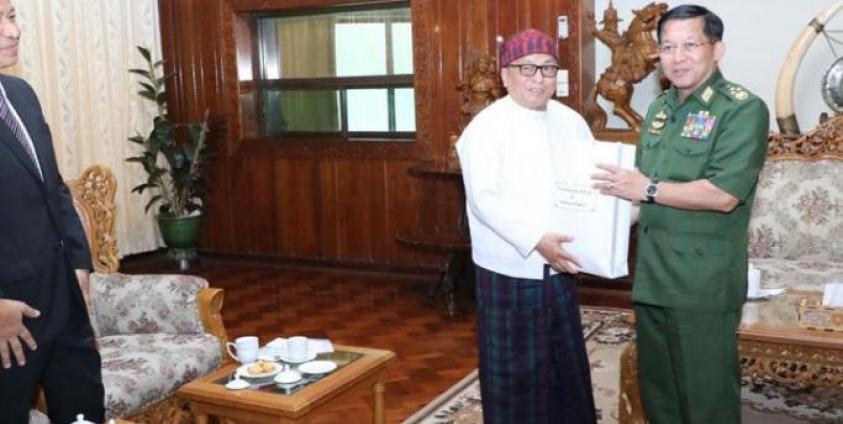Many were really surprised when they heard of the Tatmadaw’s withdrawal of lawsuit on Kachin Baptist Convention (KBC) Chairman Reverent Dr Hkalam Samson which originally was filed as defamation charge against him.
In July, KBC chairman told US President Donald Trump that there was no religious freedom and that oppression and torture are still common in Myanmar. He complained of the ongoing fighting between Ethnic Armed Organizations (EAOs) and the Myanmar military or Tatmadaw despite the return of an elected civilian government. He explicitly also asked the US to back Myanmar’s transition to democratic federalism system of governance.
In August, Lieutenant-Colonel Than Htike from the Myanmar military’s Northern Command based in Kachin State submitted a complaint against Dr Hkalam Samson at the Myitkyina Township Court, in which the conversation between the religious leader and the US president on the Facebook page of the ABC program World News Now was submitted, according to court documents.
On September 9, the military withdrew the lawsuit against Dr Hkalam Samson without explanation. Commander-in-Chief Gen Min Aung Hlaing was said to be behind the withdrawal according to Dr Khalam Samson, who has met him in Mandalay, reported Myanmar Now recently.
The inquiry of Myanmar Now on what the commander-in-chief has said regarding the matter, Dr Hkalam Samson said: “It is his procedure. (He said) there is no international pressure and is his own decision. He thought that suing is not appropriate and made a decision asking for the withdrawal.”
The reverent told the commander-in-chief that the Tatmadaw’s withdrawal of lawsuit against him is seen by the world as a major change of its attitude and for the sake of peace it should continue to be patient and be flexible as a big brother, according to Myanmar Now.
Reportedly, issues concerning internally displaced persons (IDPs), ways to accelerate the peace process in Kachin State and religious freedom were also discussed between the two.
At the same time, the Tatmadaw has been making a series of donations to non-Buddhist religious communities in a move what it said was aimed at building national unity. Senior General Min Aung Hlaing has been donating cash and provisions to various Christian and Muslim religious communities around the country since a few weeks ago.
To drive home his intended message, Min Aung Hlaing told the reverent during the meeting: “Concerning religion I don’t have any intention of segregation.”
On the question of how the reverent sees the commander-in-chief’s opinion, he replied: “I see and feel that the Tatmadaw really wants to change. (He is) really driving at achieving peace. That’s why my view is that he is really convincingly saying it and that is the feeling inside me.”
If the commander-in-chief aim is send the message that the Tatmadaw is reforming to become more tolerance and accommodating peaceful co-existence of different religions, it is too early to predict whether the international community is ready to believe him.
Some are of the opinion that the US visa sanctions on the commander-in-chief and his three generals a month ago, including the UN’s Fact-finding Mission on Myanmar (FFM) report and the hand over of it to the Independent Investigative Mechanism for Myanmar (IIMM) the extensive information it collected over the last two years on September 9, might have soften the commander-in-chief’s attitude of constant denial.
The Mission’s evidence has been preserved and transferred to the IIMM in a manner that ensures its integrity so it can be used in criminal trials in courts outside Myanmar, wrote the United Nations Human Rights Council on its website.
“This is an important step in achieving justice for victims and accountability for serious crimes,” added the report.
While the withdrawal of lawsuit on KBC chairman is a welcome move, Tatmadaw still needs to do a lot more if it wants to salvage its image by gearing up for more reform.
For example, its lawsuits against the three monks have to be revoked.
The monk U Thawbita, is facing a lawsuit for violating Article 66(d) and Section 505(b); the monk U Sein Ti Ta is slapped with Article 66(d) after the court rejected a lawsuit under Section 505(b) in July; and the monk, U Arriyawuntha, whose lawsuit was based on his comments over 30 million kyats in donations made by a senior military officer to the ultra-nationalist group Buddha-Dhamma Parahita Foundation, formerly known as Ma Ba Tha.
Section 505(b) of the Penal Code for sedition is punishable for up to 2 years of imprisonment and Article 66(d) of the Telecommunications Law can carry a sentence of up to three years in prison.
Moreover, Tatmadaw will have to show more patience and accommodative attitude in the upcoming September 17, bilateral ceasefire negotiation talks meeting in Kengtung between itself and the four-member Northern Alliance – Burma (NA-B) to end the armed conflict in northern Shan and Arakan States, if the issues of IDPs, acceleration of peace and religious freedom are to be satisfactorily resolved.






